The Foundation of Strong Relationships
At the heart of every thriving relationship lies a critical skill: effective communication. Whether with partners, family, or friends, the ability to exchange thoughts and emotions openly and respectfully can prevent conflicts, deepen bonds, and foster mutual understanding. This article explores essential strategies, expert insights, and practical exercises that empower individuals to improve communication skills, ultimately strengthening their relationships.
Understanding Healthy Communication in Relationships
What are the key features of healthy communication in relationships?
Healthy communication in relationships is built on honest and respectful communication. It involves openly expressing your feelings instead of hiding them, which helps prevent misunderstandings and conflicts. Equally important is validating your partner's feelings—acknowledging and respecting their emotions fosters empathy and connection. When both partners listen actively, staying fully present and reflecting back what they hear, it strengthens mutual understanding and trust. Setting clear conversation goals, such as seeking compromise or understanding, further supports constructive dialogue.
Which negative communication habits undermine relationship health?
Unhealthy communication habits can damage relationships over time. Bottling up emotions instead of sharing them leads to frustration and resentment. Passive-aggressiveness, such as giving the silent treatment or talking over your partner, disrupts honest exchanges. Dismissing your partner’s feelings or becoming defensive shuts down open dialogue. Introducing unrelated past issues or engaging in contemptuous behavior deepens conflict. Avoiding these behaviors is essential to maintain respectful and effective communication.
Why are honesty, respect, and validation important in communication?
Honesty and respect create a safe space for both partners to share their thoughts and emotions without fear of judgment. Respectful communication recognizes the partner's viewpoint and feelings, even during disagreements. Validating their emotions shows you value their experience, which decreases defensiveness and fosters emotional closeness. Together, these practices help resolve conflicts healthily and sustain relationship satisfaction.
Maintaining these communication traits nurtures a positive and supportive relationship, empowering couples to navigate challenges together with openness and understanding.
Active Listening: The Cornerstone of Connection
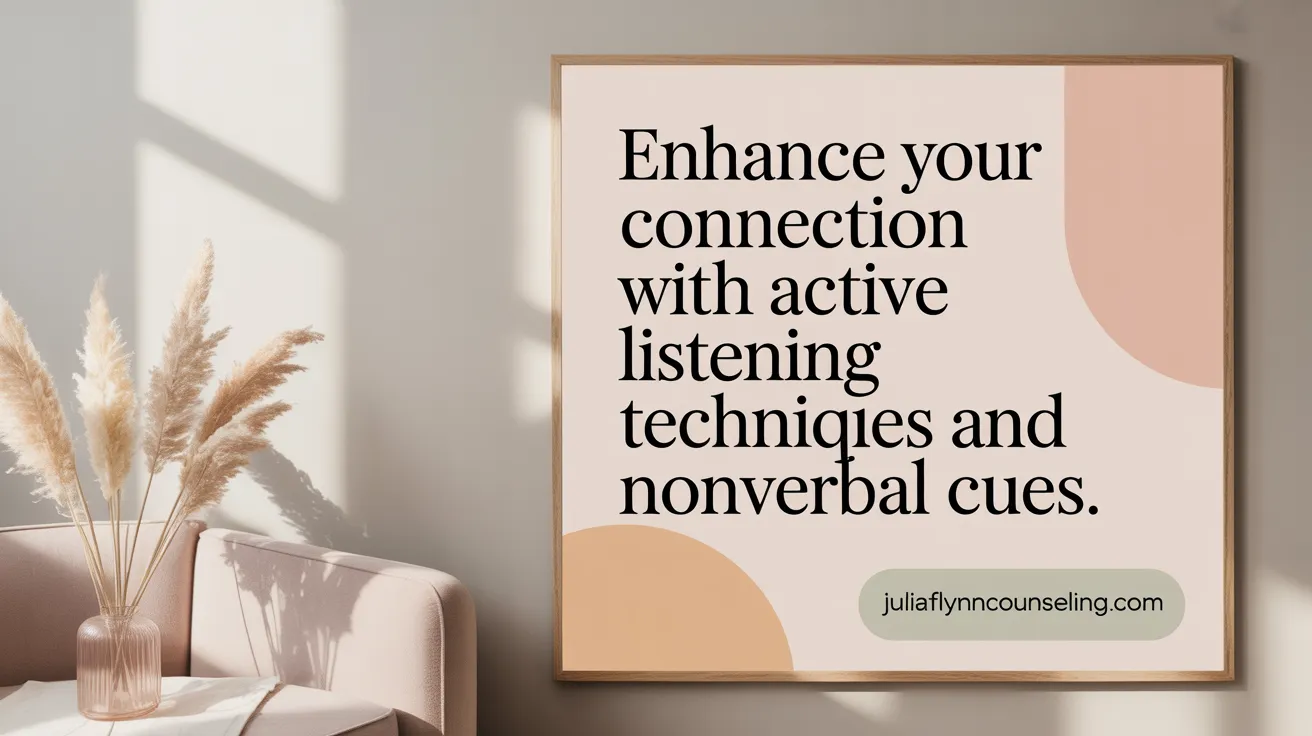
What is active listening and why is it important?
Active listening means being fully present during conversations—giving your undivided attention to your partner without distractions. It involves reflecting back what you hear and showing empathy towards their feelings and thoughts. This form of listening not only deepens emotional connections but also helps reduce misunderstandings and prevents conflicts from escalating. For more on active listening techniques, see resources on improving communication skills in relationships.
Techniques to practice active listening
To enhance active listening skills, try the following:
- Maintain eye contact to show engagement.
- Avoid interrupting or planning your response while your partner is speaking.
- Use paraphrasing: restate what you heard to confirm understanding.
- Ask open-ended questions to encourage deeper sharing.
- Show empathy by acknowledging your partner’s feelings.
Explore effective communication tips for concrete ways to build better listening and dialogue skills.
Nonverbal communication cues
Nonverbal signals often speak louder than words. Facial expressions, tone of voice, gestures, body posture, and eye contact add layers of meaning to what is being said. Consistency between your words and body language strengthens trust; mismatches can cause confusion. Being aware of your nonverbal cues and reading your partner's can help create a more authentic and clear exchange. Learn more about nonverbal communication cues to improve your overall communication.
How active listening fosters empathy and understanding
By truly hearing and validating your partner’s feelings, active listening creates a safe space for open expression. This builds empathy as you connect with their emotional experience. Such understanding promotes patience and cooperation, making conflict resolution more constructive and relationships stronger overall. For guidance on healthy communication in relationships, including validation strategies, visit the linked resource.
Active listening is foundational for meaningful communication. Practicing it regularly with attention to verbal and nonverbal cues nourishes empathy, deepens bonds, and supports healthier relationships. For exercises and techniques to strengthen this skill, see communication exercises for couples.
Using 'I' Statements and Constructive Dialogue
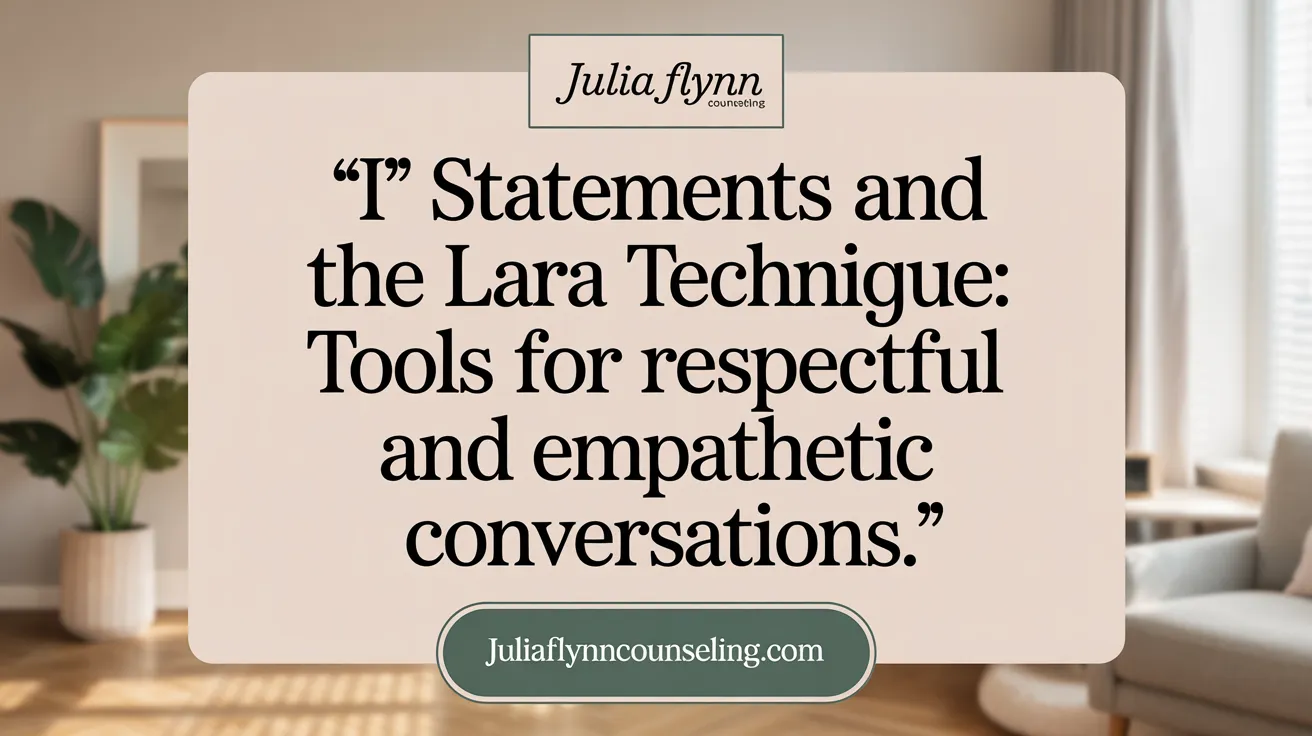
How do 'I' statements improve communication?
Using 'I' statements in communication allows individuals to express their feelings without blaming or accusing their partner. This technique helps reduce defensiveness and encourages openness, making it easier to resolve conflicts. For example, saying "I feel hurt when plans change last minute" focuses on personal emotions rather than assigning fault, fostering a more productive exchange.
Benefits of 'I' statements
- Reduce hostility and blame
- Promote clarity about personal feelings
- Encourage empathy and understanding
- Enable respectful conversations
These benefits are highlighted in resources such as Effective Communication in Relationships and Healthy Relationships through Communication.
What is the LARA technique and how does it help?
The LARA technique is a communication strategy comprising four steps: Listen actively, Affirm understanding, Respond thoughtfully, and Add one's own thoughts. This approach fosters a safe and constructive dialogue by ensuring both partners feel heard and validated. It helps to deepen empathy and reduce conflicts by preventing misunderstandings. Learn more about The LARA Communication Technique.
Avoiding blame and criticism
Avoiding blaming language and criticism is crucial for healthy conversations. Instead of pointing fingers, focusing on one’s own feelings and experiences helps keep discussions constructive. This reduces the risk of escalating tension and fosters a supportive environment for problem-solving. See strategies in Avoiding negative communication habits and Communication Skills for building Strong relationships.
Promoting empathetic responses
Empathy plays a vital role in effective communication. By sincerely listening and affirming your partner’s feelings, you create a connection that encourages openness and trust. Empathetic responses assist in understanding underlying emotions and pave the way for mutual respect and cooperation. For detailed guidance, refer to Active Listening Techniques and Empathy and Communication Exercises for Couples.
Timing and Preparation: Setting the Stage for Effective Communication
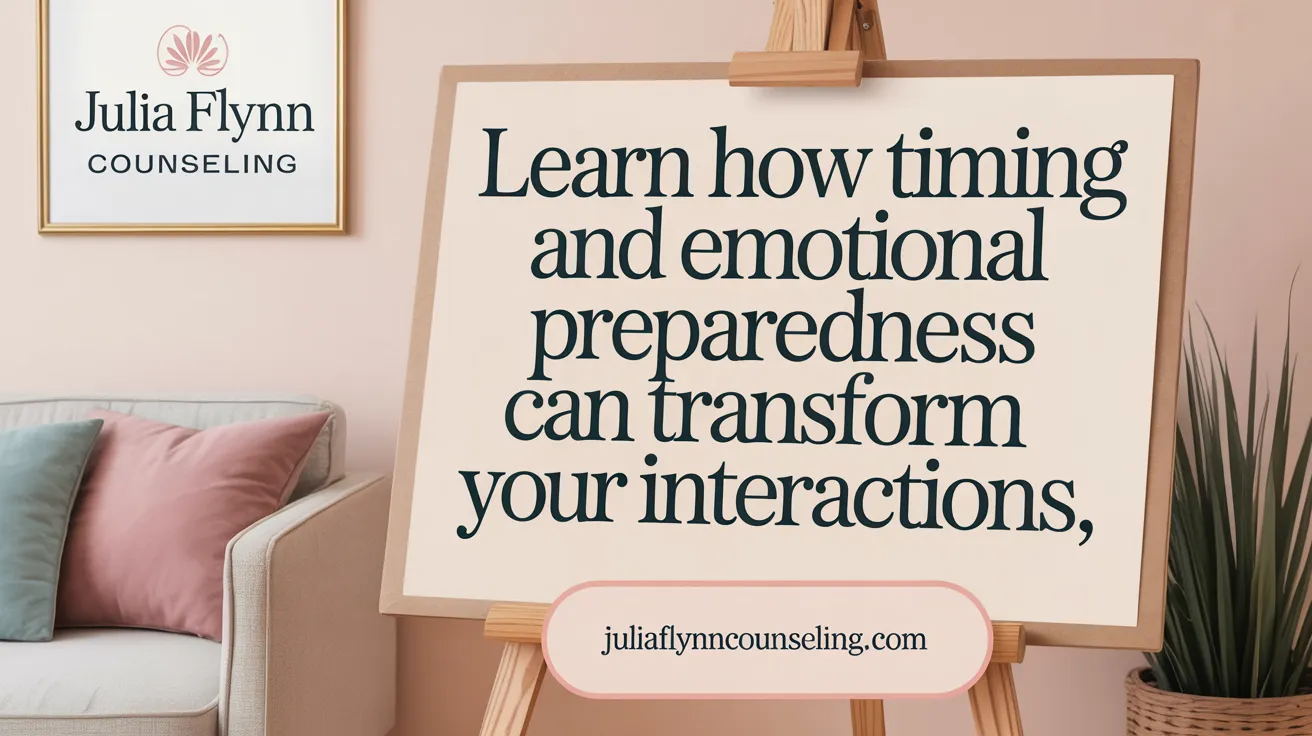
Why is timing important when bringing up conflicts?
Choosing the right moment to discuss conflicts plays a crucial role in maintaining effective communication between partners. When both individuals are calm, focused, and emotionally regulated, the chances of a constructive conversation significantly increase. Addressing issues at inconvenient or stressful times can lead to misunderstandings or escalated tensions, making resolution difficult.
How does preparing emotionally improve communication?
Emotional preparedness involves understanding and managing one's feelings before entering into a discussion. By reflecting on personal emotions, individuals can communicate their concerns more clearly and respectfully. This self-awareness helps prevent reactive responses such as defensiveness or passive aggression, promoting healthier conflict resolution and mutual understanding.
What role do shared communication preferences play?
Couples benefit from openly discussing and aligning on their preferred communication styles, including how often and by what means they communicate important matters. Establishing these preferences creates a shared framework that respects each partner's needs and boundaries. It also encourages consistency, reduces miscommunication, and fosters a supportive environment for ongoing dialogue.
Setting clear conversation goals, such as seeking understanding, voicing concerns honestly, or working toward compromise, further enhances the effectiveness of discussions. Together, these timing and preparation strategies create a foundation for respectful and meaningful communication that strengthens relationship bonds.
Navigating Conflict Through Constructive Communication
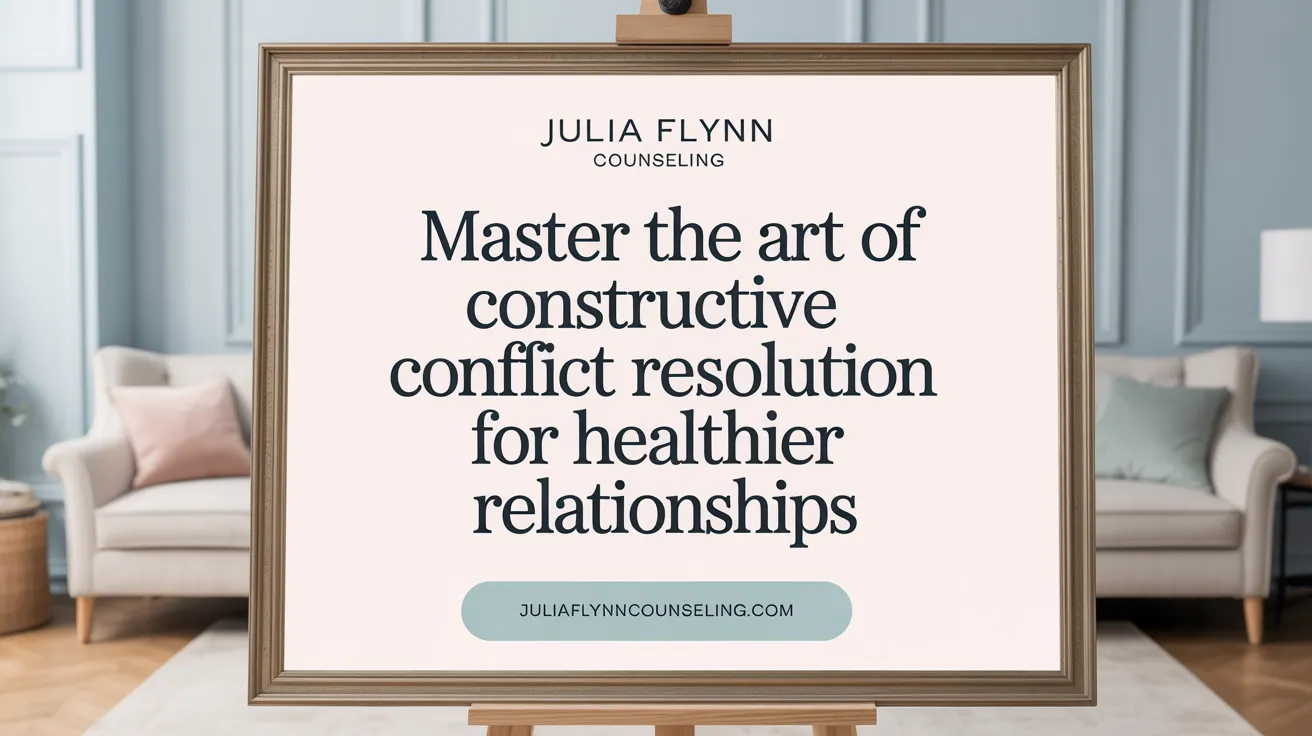
How can couples handle conflicts constructively?
Couples can resolve conflicts effectively by adopting gentle approaches such as using soft start-ups to begin conversations calmly and kindly. Focusing exclusively on the present issue helps prevent old grievances from resurfacing unnecessarily. Avoiding destructive communication patterns known as the 'Four Horsemen'—criticism, defensiveness, contempt, and stonewalling—plays a vital role in maintaining a healthy dialogue and reducing hostility. Additionally, making repair attempts, such as offering apologies or clarifying misunderstandings, supports reconciliation and keeps the conversation constructive (Healthy Relationships through Communication).
What is the value of time-outs in heated discussions?
Taking time-outs during emotionally charged moments allows partners to regulate their feelings and avoid escalating conflicts. By stepping away temporarily, each person gains perspective and can return to the discussion with a calmer mindset. This pause helps prevent impulsive reactions and promotes clearer, more thoughtful communication when the conversation resumes. Setting a specific time to regroup after a time-out ensures the issue is addressed without indefinite delays (Managing Conflict in Relationships).
Strategies for resolving disagreements
- Choose the right time to discuss issues when both partners are focused.
- Express feelings respectfully using 'I' statements.
- Validate each other's emotions to foster empathy.
- Stay on topic and avoid bringing up unrelated grievances.
- Seek compromises or mutually agreeable solutions (Effective Communication Tips).
Avoiding destructive behaviors like the 'Four Horsemen'
| Behavior | Description | Impact on Relationship |
|---|---|---|
| Criticism | Attacking partner’s character instead of behavior | Breeds resentment and defensiveness (Gottman Institute) |
| Defensiveness | Responding with counter-attacks | Blocks understanding and problem-solving (Healthy Relationships |
| Contempt | Showing disrespect or mocking | Erodes respect and intimacy (Four Horsemen and Relationship Stability |
| Stonewalling | Withdrawing or refusing to engage | Creates distance and unresolved tension (Communication Issues) |
Soft start-up and repair attempts
Starting conversations gently sets a positive tone and encourages openness. Repair attempts during conflicts—like humor, apologies, or acknowledging hurt feelings—help de-escalate tensions and rebuild connection (Communication Exercises for Couples).
Taking productive time-outs
Time-outs are deliberate breaks taken to cool down heightened emotions during disputes. A productive time-out includes agreeing on when to return and what to address next, ensuring the conflict is resolved thoughtfully and respectfully (Managing Conflict through Communication.
Using these constructive communication techniques empowers couples to navigate conflicts healthily, preserving trust and deepening their emotional bond (Improve Communication Skills in Your Relationship).
Building Trust and Emotional Connection Through Communication
How does expressing appreciation affect relationships?
Expressing appreciation and gratitude regularly helps focus attention on the positive aspects of a relationship. This practice reinforces emotional connection and helps counterbalance the natural tendency to focus on negatives as relationships mature. Small acts of kindness and tailored affirmations can uplift partners, strengthening bonds and maintaining a loving atmosphere (Simple ways to strengthen your relationship, Strengthen your relationship).
Why is sharing vulnerability important?
Sharing vulnerability means being open about deep thoughts, fears, and personal feelings. This honesty fosters intimacy and trust, allowing partners to understand each other more deeply. Vulnerability interrupts negative patterns, encourages empathy, and builds a foundation of authenticity, which is crucial for emotional closeness and resilience (Sharing vulnerabilities for intimacy, Healthy communication in relationships.
What is Active Constructive Responding (ACR)?
Active Constructive Responding (ACR) is a communication technique that involves responding to a partner's positive news with genuine enthusiasm and engagement. This method fosters a sense of closeness, acceptance, and respect. It serves as a way to "deposit" emotional goodwill into the relationship, enhancing joy and emotional durability over time (Emotional bank account in relationships, Communication Exercises for Couples.
How do regular check-ins support emotional satisfaction?
Regularly checking in with your partner about emotional well-being and relationship satisfaction helps maintain healthy communication and emotional balance. These moments create opportunities to address concerns early, refresh mutual understanding, and ensure both partners feel valued and connected. Scheduled "relationship check-ups" or casual conversations can sustain ongoing intimacy and trust (Regular relationship check-ins, Communication Skills for building Strong relationships, Managing conflict in relationships.
Engaging in these communication practices—appreciation, vulnerability, active constructive responding, and check-ins—builds a stronger, more trusting emotional connection that supports long-term relationship health and satisfaction (Healthy Relationships through Communication, Effective Communication in Relationships.
Practical Communication Exercises to Strengthen Relationships
What are effective communication exercises couples can practice?
Couples can enhance their communication by engaging in several targeted exercises. Active listening exercises involve one partner speaking uninterrupted while the other fully concentrates, reflects back what is heard, and shows empathy. Practicing 'I' statements helps express feelings without blame, for example, saying "I feel upset when..." instead of accusing. Asking open-ended questions encourages partners to share deeper thoughts and feelings, fostering honesty and bonding.
How do these exercises improve relationships?
These communication practices strengthen relationships by deepening emotional intimacy and reducing misunderstandings. Active listening builds empathy and makes partners feel truly heard, while 'I' statements minimize defensiveness and conflict escalation. Open-ended questions invite more meaningful dialogue, leading to better understanding. Incorporating gratitude techniques, like regularly expressing appreciation for each other, promotes positivity and trust.
Through consistent practice of these exercises, couples develop stronger connections, improve conflict resolution, and maintain a healthy emotional balance, ultimately supporting long-term relationship satisfaction and resilience.
Recognizing and Overcoming Communication Barriers
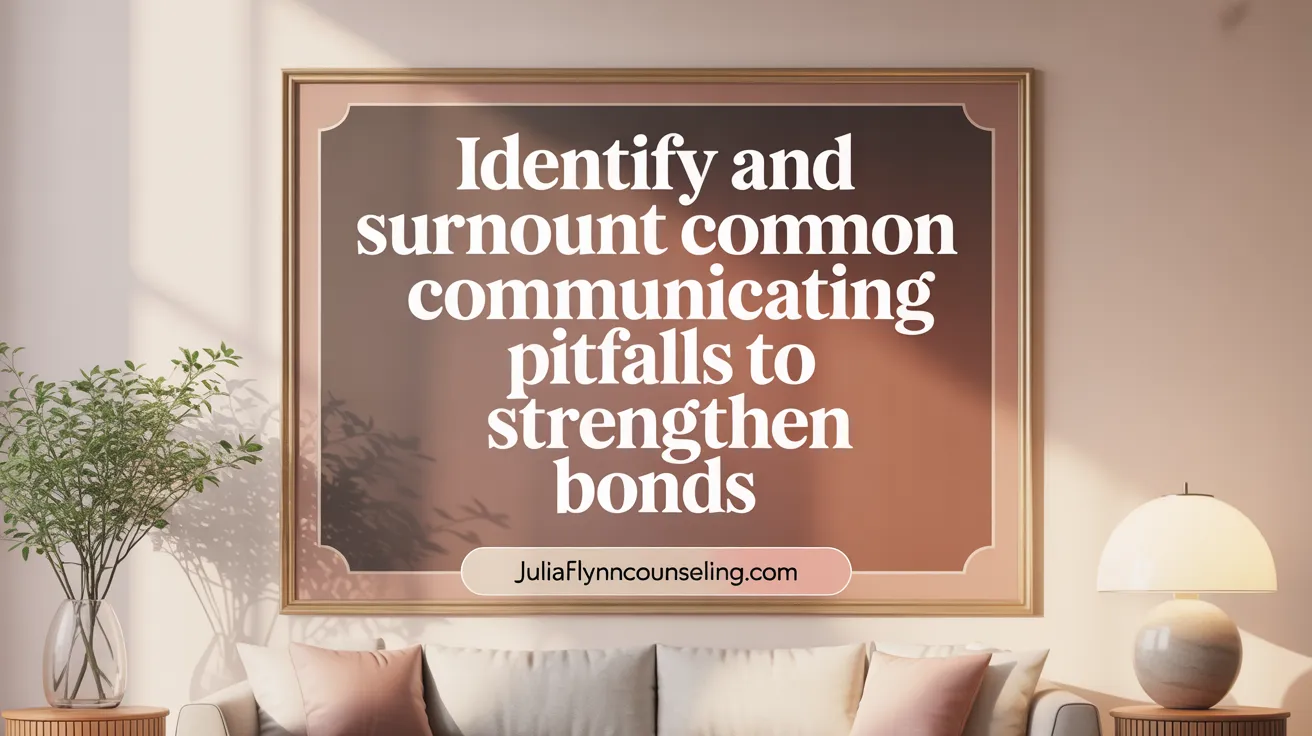
What communication issues commonly weaken relationships?
Relationships often suffer from unhealthy communication patterns such as passive-aggressiveness, stonewalling, and defensiveness, creating distance and escalating conflicts instead of resolving them. Additionally, making assumptions without verifying your partner’s thoughts and feelings can lead to misunderstandings that erode trust and connection.
How does non-shared knowledge affect communication?
A lack of shared information or differing perspectives can cause confusion and frustration. When partners do not have access to the same facts or have unspoken expectations, misinterpretations arise. This non-shared knowledge silently builds barriers that prevent open and honest dialogue.
What is the role of emotional fears and histories in communication breakdowns?
Underlying emotional fears, past hurts, and personal histories deeply influence how couples communicate. These unresolved feelings often manifest during conflicts, causing reactions that seem disproportionate or unrelated to the present issue. Recognizing these emotional roots helps partners respond with empathy rather than defensiveness as described in managing conflict tips.
When should couples seek counseling for communication problems?
Professional help should be sought if conflicts persist over time, communication turns hostile or destructive, or if trust issues remain despite repeated efforts. Couples counseling provides tools to break cyclical negative patterns and fosters a safer environment for honest discussion.
Identifying these barriers and actively working to overcome them strengthens the emotional bond and promotes a healthier, more resilient relationship as supported by The Gottman Institute.
Learning Communication Skills for Professional and Personal Growth
What educational resources support communication skill development?
Several high-quality resources are available for those wishing to enhance their communication skills. Notably, the University of Pennsylvania offers a course titled "Improving Communication Skills" as part of its Achieving Personal and Professional Success specialization. This course, taught by Professor Maurice Schweitzer, covers essential aspects like active listening, negotiation, trust-building, understanding deception, and strategic communication. Such a curriculum benefits not only professional environments but also offers practical approach to improving personal relationships.
Additionally, trusted online platforms such as Coursera collaborate with top universities to provide verified certifications that bolster both skillsets and professional credentials.
How do improved communication skills benefit relationships and careers?
Developing strong communication competencies creates a foundation of trust and understanding that positively impacts both personal and professional domains. Key benefits include:
- Reduced conflicts through constructive and clear dialogue
- Enhanced problem-solving and negotiation abilities
- Improved emotional intelligence, fostering empathy and better interpersonal connections
- Strengthened teamwork and leadership capabilities
In relationships, effective communication nurtures intimacy and collaboration, as detailed in healthy communication tips, while in careers, it promotes productivity, morale, and successful collaborations (effective communication in the workplace).
Recommended books and literature on communication
To deepen understanding, several insightful books are suggested by experts throughout the field:
- "Unleash the Power of Storytelling" provides methods for crafting compelling narratives to enhance engagement.
- "Five Stars" by Carmine Gallo explains the art of persuasion leveraging ethos, logos, and pathos.
- "Just Listen" by Mark Goulston teaches vital listening skills to break down emotional barriers.
- "We Need to Talk" by Celeste Headlee focuses on restoring meaningful face-to-face conversations.
- "Power Questions" offers strategic inquiries designed to strengthen relationships and influence.
These resources complement formal education and practical experience, offering diverse approaches to mastering communication for lasting relationship and career growth.
The Path to Stronger Relationships Through Communication
Improving communication skills is a transformative journey that enhances relationship quality by fostering understanding, trust, and emotional connection. Through practicing active listening, empathetic dialogue, timing conversations effectively, managing conflicts constructively, and embracing vulnerability, couples and partners can build resilience and intimacy that endure life's challenges. Complemented by practical exercises and supported by educational resources, mastering communication empowers individuals to cultivate healthier, happier relationships and personal growth.
